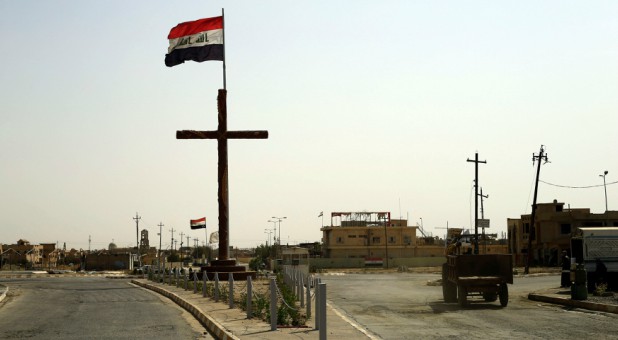Women Suffer More Complex Persecution Than Men, Report Finds
In the latest in-depth report focused on gender persecution, the 2019 Open Doors World Watch List reveals that gender contributes to a large disparity in the methods used for religious persecution. While men experience religious persecution that is focused, severe and visible due to socioeconomic ostracism and brutal physical violence, women, who face double persecution because of their gender and religious beliefs, experience religious persecution that is violent, hidden and complex from sexual violence, forced marriage and rape. Rape was found to be common in 47 percent of the 50 countries surveyed among women who identified as Christian.
Rita, a Christian woman from the Iraqi town of Qaraqosh, is still suffering with the hidden wounds of persecution. She was 26 when Islamic State militants invaded and took her captive (she was one of the Iraqis who stayed and resolved to not leave her elderly father). Over the course of four years, Rita was sold and bought four times as a sex slave and endured beatings, rape, mockery, intimidation, isolation and more before finally being freed in 2017. Islamic State militants see Christian women as goods they can buy, sell and torture for disobedience, she said.
As Christians, women are also largely restricted in their free choice or practice of religion through domestic and social actors. Persecutors can simply take advantage of women’s limitations and vulnerabilities as women in their culture in combination with their vulnerabilities as members of a minority faith. Christian women are much more vulnerable to sexual violence like rape and forced marriage than other women.
In 59 percent of the 50 countries surveyed, sexual assault was described as a characteristic of religious persecution. Christian women who do not dress like Muslim women, such as not wearing a hijab, are easily and immediately identified and can be subject to sexual harassment on the street.
For women, rape and sexual violence are connected to honor and used intentionally to dishonor Christian women and their community. Women will bring shame upon their families if they fail to uphold high norms surrounding their sexuality. Thus if a woman converts to Christianity, she is much more prone to sexual violence. Rape is often used as a deliberate form of punishment in reaction to conversion to Christianity.
When Esther was 17, Boko Haram attacked her Christian village of Gwoza in Nigeria’s Borno state and abducted her, along with numerous other young girls. The militants did everything they could to make the Christian girls renounce their faith. A few of the men wanted to marry Esther. Because she would not give in to their demands to renounce her faith and marry, Esther was raped continually as punishment and eventually impregnated by one of the many men who violated her.
Other means of punishment due to conversion include forced divorce and denial of custody of children: 35 percent of the countries surveyed mentioned forced divorce, and 31 percent of surveyed countries mentioned denial of custody of children for Christian women. If their Christian conversion is discovered, women are also often forced to marry a Muslim as a means of bringing the woman back to the correct religion, a task put on the new husband. Other times, a Christian girl is kidnapped and forced into marriage in a dominant-religion family. Of those countries surveyed, 57 percent noted forced marriage as a means to persecute Christian women.
Maizah is one of thousands of women who faced the possibility of a forced marriage when she chose to leave Islam and convert to Christianity. When her conversion was exposed, Maizah was beaten by a group of Muslim men who demanded she become the fourth wife of one of the men who had just attacked her. Maizah was forced to flee her home.
“Religious persecution is gender-specific. The way men and women experience religious persecution is directly associated with their socio-culturally accepted gender identity and roles. Women have virtually no means legally or in society to stand up for themselves and fight against these human rights violations,” said David Curry, president and CEO of Open Doors USA.
For men, economic harassment ranked No. 1 as the primary pressure point of religious persecution, followed by shaming or shunning, physical violence, government incarceration and military/militia service. Because of this, men are most vulnerable in their positions as primary breadwinners and church leaders. Because men are seen as willfully making the wrong religious choice—as opposed to women who are perceived as misguided—men are more likely to face harsher punishments and physical abuse and torture. (Women are also less likely to be killed for their faith because of this perception.) Men are also more likely to be imprisoned for their faith by the state, as one third of the 50 countries surveyed said the government used arrests, interrogations, legal charges and sentencing or indefinite imprisonment without charge as means of religious persecution and intimidation. In contrast, only 8 percent of countries surveyed cited using this means for women. Physical violence was cited in 36 percent of the countries for men. The inclusion of torture as a part of physical violence occurs only with men, except in North Korea, which uses torture on both.
Both men and woman face shaming or shunning equally as a means to dissuade them from their chosen faith. This is an especially powerful means of social pressure for countries with a highly explicit honor-shame system such as India and Pakistan.
Listen to the podcast to hear David Curry discuss persecution in depth.













































